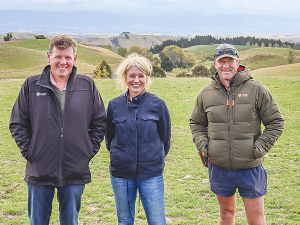Females are dominating the veterinary profession worldwide and many farmers are welcoming this change in the composition of the profession, says Britain's Chief Veterinary Officer (CVO) Professor Christine Middlemiss.
She says one of the changes since she graduated in 1992 is the greater number of females entering the profession.
Middlemiss was in New Zealand recently to meet her fellow CVOs from NZ, Australia, Canada and the US. The CVOs keep in regular contact with each other and meet once a year for face-to-face discussions.
She says issues discussed this time included microbial resistance, a world-wide shortage of vets as well as ongoing biosecurity and animal health and welfare.
Speaking to Rural News, Middlemiss recalled that in her days as a vet, it was about a 50% male/female mix.
"Now it has risen to 85% female pretty much world-wide. Everyone has different views on this, but I suspect there are more female role models and that encourages more women to see it as a profession they would like to enter," she says.
Middlemiss says nowadays there are more specialised veterinary practices than when she started off as a vet. She says practices did farm animals as well as small animals, but now people tend to choose one or the other.
She says the whole attitude to a work-life balance and more flexibility within the workplace, and new legislation giving effect to that, is probably another reason why the veterinary profession has become more attractive to women. She says this gives women the ability to have a family and still work.
"What we don't know much about is why boys are not entering the profession, after all, it's pretty difficult to talk to them if they don't apply," she says.
Middlemiss says it matters little if a vet is male or female - the job is about having the right skills and being able to communicate with the owners of animals. She says she was once told by one of her mentors that it didn't matter so much about how clever you are as it was to remember that every animal has an owner and being able to communicate with them was critical.
She says when a female vet turns up for the first time, they often get the raised eyebrow look from a farmer and a comment that the 'girl vet has turned up'. But she adds that quickly any prejudice wears off and we get farmers specifically asking for that same 'girl' vet.
"I come from a farming family in Scotland and before I became a vet did quite a lot of farm work, so I know my way around livestock.
"Maybe you're not as strong as some of the men, but you're there to get the job done. And just remember I can get two hands in a cow to calve it," she says.
Vital Vets
Farmers are being urged to make their veterinarians an integral part of their farm management team.
This is the advice of Britain's Chief Veterinary Officer (CVO) Professor Christine Middlemiss who was in New Zealand recently for discussions with her fellow CVOs from New Zealand, Australia, Canada and the US. The group meets once a year and NZ hosted the meeting this year.
There is clear evidence that shows that vets are trusted independent advisors and can offer a lot more than just turning up to deal with a sick animal, she adds.
"They are not just your animal health team, but they are also your business team because we can work with farmers to prevent problems occurring on farm and this makes good economic sense. They can also offer good advice around nutrition and grass management," she says.
Middlemiss says vets are also well clued up on wider issues around farming through their links to their own professional body and government and industry organisations, and having the right information is key step to making the right on-farm decision. She says the other positive that vets bring to a farming business is that their decisions and information are based on strong scientific evidence.
One somewhat puzzling statistic that Professor Middlemiss points to in the UK is that 75% of those who stopped practicing as vets did so within four years or less after graduating.



















